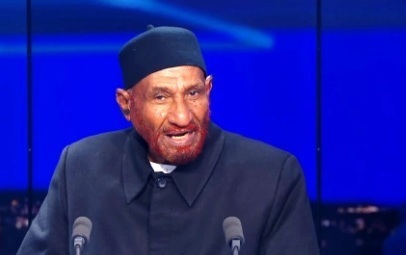Al-Mahdi voices his support for Hamdok leadership of Sudan’s interim cabinet
August 28, 2019 (KHARTOUM) – National Umma Party (NUP) leader Sadiq al-Mahdi said on Wednesday they reject the introduction of a quota system for the formation of the transitional government and vowed to support the newly prime minister against the intrusion of some leftists groups of the Forces for Freedom and Change (FFC).

“Some of our colleagues are looking forward to a quota in the composition of the cabinet. This is unacceptable, and we promised the prime minister that he is free to choose his ministers and to control their work,” said the former prime minister.
He added that they also rejected a proposal by some of their allies to form an advisory council for the ministries.
“This violates the responsibility of ministers and is incorrect. The council should exercise its executive powers without interference,” he said before to add “We are committed to supporting them and protecting them from the campaigns of lost leftists and disenchanted partisans of the ousted regime.”
The FFC which is large coalition including democratic forces from the left, centre and right struggle on daily basis to overcome the old frictions that divided them during long 30 years and prevented them from unifying their efforts to bring down the totalitarian regime of Omer al-Bashir.
The centre and liberal forces complain that the small leftist groups and nationalist Arabs seek to impose the quota system they refused for the armed groups and to control the action of the ministers.
Al-Mahdi said that the transitional period is facing major challenges related to achieving a just and comprehensive peace. He underlined that the dispute between the armed groups makes that any agreement with either side will provoke the other.
“There is a huge distrust that hinders the peace process, and there are alliances between some of them and non-Sudanese forces in neighbouring countries and perhaps with non-neighbouring countries,” he said without naming them.
Al-Mahdi further stressed the need to hold an economic forum, ” a Davos for Sudan” to draw the regional and international support for Sudan as soon as possible. He also called on the Sudanese Diaspora to pay a “liberation tax” in hard currency.
The UN officials say they prepare to hold a high-level meeting on Sudan on the sidelines of the UN General Assembly next September to consider ways to support the east African nation.
CONSTITUTIONAL FLAWS
Al-Mahdi further pointed out flaws in the constitutional document, which could have been avoided, as he said.
“Islam should have been stated as the religion of the majority of Sudanese, and its (political) preachers have the right to aspire to the application of its teachings, provided that the rights of equal citizenship for all, freedom of belief for all religions, and commitment to a democratic regime are adhered to.”
“It should have been stipulated that Arabic is the national language of the country while ensuring the rights of other cultures and languages in the country,” he added.
He went further to underscore that these flaws and a sense of exclusion will provide an opportunity to partisans of the deposed regime to work to thwart the transitional government.
Some Sudanese Islamists groups led by the Popular Congress said they would work to topple the government of the FFC groups pointing it seeks to abolish Islamic legislations.
(ST)

